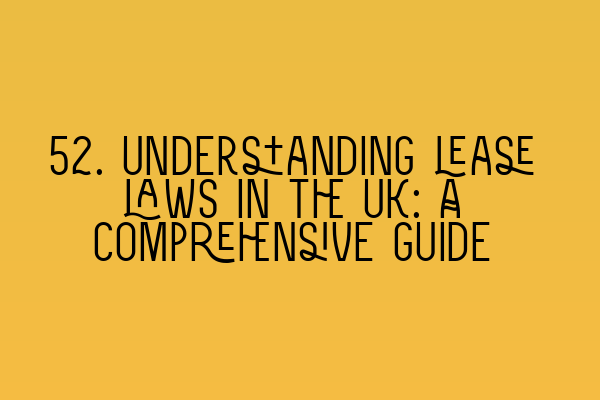52. Understanding Lease Laws in the UK: A Comprehensive Guide
Welcome to SQE Property Law & Land Law! As a solicitor, it is crucial for me to stay updated with the latest information and regulations regarding lease laws in the UK. In this comprehensive guide, I will take you through the key aspects of lease laws, providing you with a thorough understanding of this vital area of property law.
1. What is a Lease?
Before we delve into the specifics, let’s start with the basics. A lease is a contractual agreement between a landlord (also known as the lessor) and a tenant (the lessee). It grants the tenant the right to occupy a property for a specific period, known as the lease term, in exchange for payment of rent.
2. Types of Leases
There are various types of leases in the UK, each with its own unique characteristics:
- Assured Shorthold Tenancy (AST): This is the most common type of residential lease in the UK. It provides tenants with a minimum tenancy term of six months, allowing the landlord to repossess the property after providing a two-month notice.
- Assured Tenancy: This lease offers the tenant more rights and security, providing them with long-term occupancy and protection from eviction.
- Commercial Lease: These leases are used for commercial properties, allowing businesses to occupy premises for their operations. They often have longer lease terms and different legal requirements compared to residential leases.
- Ground Lease: In this type of lease, the tenant only owns the rights to the property for a specified period, after which ownership reverts to the landlord.
Understanding the different types of leases is essential as they have varying legal implications and regulations.
3. Rights and Responsibilities of the Landlord
A landlord has several key responsibilities when entering into a lease agreement:
- Providing a Habitable Property: It is the landlord’s duty to ensure that the property is safe, secure, and in compliance with relevant health and safety regulations.
- Repairs and Maintenance: The landlord is responsible for maintaining the structural integrity of the property and ensuring essential repairs are carried out promptly.
- Protecting the Tenant’s Deposit: In the case of an AST, the landlord must protect the tenant’s deposit in a government-approved tenancy deposit scheme.
- Respecting the Tenant’s Privacy: The landlord must provide reasonable notice before entering the property, except in cases of emergency.
4. Rights and Responsibilities of the Tenant
Tenants also have specific rights and responsibilities:
- Payment of Rent: The tenant is obligated to pay rent on time as agreed in the lease.
- Taking Care of the Property: The tenant must keep the property in a clean and hygienic condition, informing the landlord promptly of any damages or repairs needed.
- Ending the Lease: The tenant must give the required notice period to terminate the lease agreement.
- Respecting the Neighbors: Tenants must ensure they do not cause nuisance or disturb other occupants of the building or neighborhood.
5. Lease Renewal and Termination
Lease renewal and termination procedures vary depending on the type of lease:
- Automatic Renewals: Some leases may have provisions for automatic renewal unless proper notice is given by either party.
- Termination Notices: It is essential to provide the correct notice period as defined in the lease agreement to terminate the lease.
- Break Clauses: Some leases include break clauses, allowing either party to terminate the lease before the specified end date.
- Eviction: In cases of non-payment of rent or breach of lease terms, landlords may initiate eviction proceedings through the courts.
6. Seek Legal Advice
Lease laws can be complex, and it is advisable to seek legal advice before entering into or terminating a lease agreement. Professional guidance will ensure that you fully understand your rights and obligations, protecting you from potential disputes or legal complications.
At SQE Property Law & Land Law, we offer comprehensive legal services to assist you in all lease-related matters. Whether you are a landlord or a tenant, our expert solicitors will provide sound advice and guidance tailored to your specific situation. Contact us today to schedule a consultation.
For more information on related topics, check out these articles:
- SQE 1 Practice Exam Questions
- SQE 1 Practice Mocks FLK1 FLK2
- SQE 2 Preparation Courses
- SQE 1 Preparation Courses
- SRA SQE Exam Dates
Thank you for reading our comprehensive guide to lease laws in the UK. We hope you found this information helpful and that it has provided you with a solid foundation for understanding lease agreements. Should you have any further questions or require legal assistance, do not hesitate to reach out to us at SQE Property Law & Land Law.
